2019-2020年高一英语必修1综合测试题及答案解析
2019-2020高一英语必修1综合测试题及答案解析
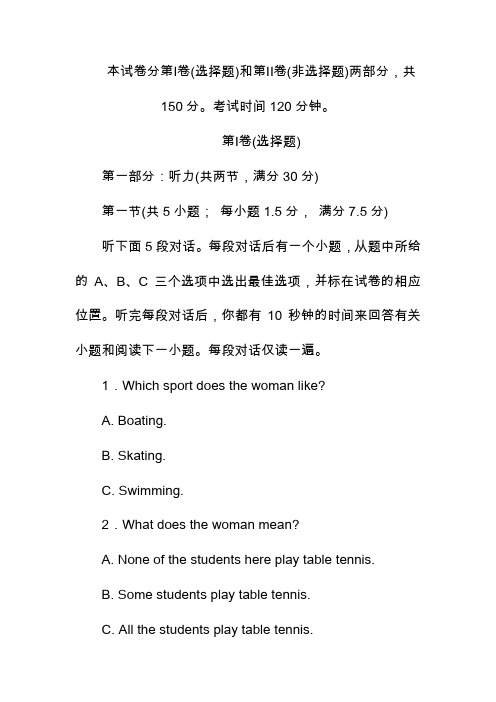
本试卷分第Ⅰ卷(选择题)和第Ⅱ卷(非选择题)两部分,共150分。
考试时间120分钟。
第Ⅰ卷(选择题)第一部分:听力(共两节,满分30分)第一节(共5小题;每小题1.5分,满分7.5分)听下面5段对话。
每段对话后有一个小题,从题中所给的A、B、C三个选项中选出最佳选项,并标在试卷的相应位置。
听完每段对话后,你都有10秒钟的时间来回答有关小题和阅读下一小题。
每段对话仅读一遍。
1.Which sport does the woman like?A. Boating.B. Skating.C. Swimming.2.What does the woman mean?A. None of the students here play table tennis.B. Some students play table tennis.C. All the students play table tennis.3.How many yards will the woman have to walk to the Castle?A. 40.B. 400.C. 4000.4.Where does the man want to go?A. To the station.B. To the supermarket.C. To a tall building.5.How often do the man's family go out?A. Twice a month.B. Once a week.C. Once a month.第二节(共15小题;每题1.5分,满分22.5分)听下面5段对话或独白。
每段对话或独白后有几个小题,从题中所给的A,B,C三个选项中选出最佳选项,并标在试卷的相应位置。
听每段对话或独白前,你将有时间阅读各个小题,每小题5秒钟;听完后,每小题将给出5秒钟的作答时间。
每段对话或独白读两遍。
听第6段材料,回答第6至7题。
2019-2020年高中英语译林版必修1习题:综合测评二+Word版含解析
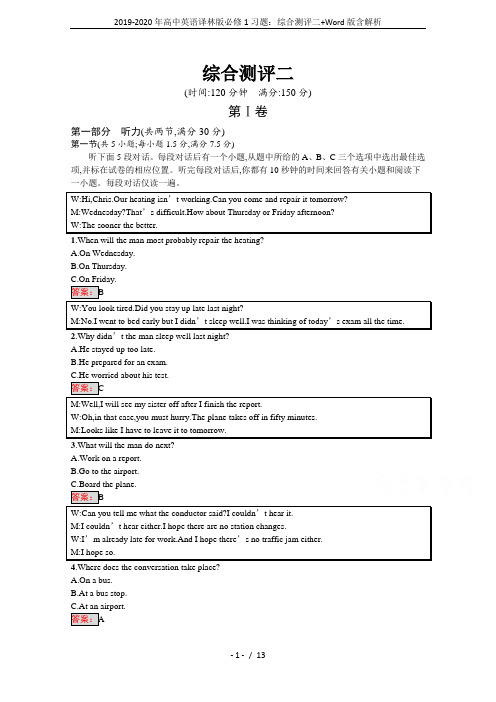
综合测评二(时间:120分钟满分:150分)第Ⅰ卷第一部分听力(共两节,满分30分)第一节(共5小题;每小题1.5分,满分7.5分)听下面5段对话。
每段对话后有一个小题,从题中所给的A、B、C三个选项中选出最佳选项,并标在试卷的相应位置。
听完每段对话后,你都有10秒钟的时间来回答有关小题和阅读下一小题。
每段对话仅读一遍。
W:Hi,Chris.Our heating isn’t working.Can you come and repair it tomorrow?M:Wednesday?That’s difficult.How about Thursday or Friday afternoon?W:The sooner the better.1.When will the man most probably repair the heating?A.On Wednesday.B.On Thursday.答案:BW:You look tired.Did you stay up late last night?M:No.I went to bed early but I didn’t sleep well.I was thinking of today’s exam all the time.2.Why didn’t the man sleep well last night?A.He stayed up too late.B.He prepared for an exam.答案:CM:Well,I will see my sister off after I finish the report.W:Oh,in that case,you must hurry.The plane takes off in fifty minutes.M:Looks like I have to leave it to tomorrow.3.What will the man do next?A.Work on a report.B.Go to the airport.答案:BW:Can you tell me what the conductor said?I couldn’t hear it.M:I couldn’t hear either.I hope there are no station changes.W:I’m already late for work.And I hope there’s no traffic jam either.M:I hope so.4.Where does the conversation take place?A.On a bus.B.At a bus stop.答案:A.What does the man mean?A.He doesn’t want any chocolate cake.B.He used to be interested in chocolate.第二节(共15小题;每小题1.5分,满分22.5分)听下面5段对话或独白。
人教版新课标高中英语 2019-2020学年 必修一 综合过关练习含答案详解
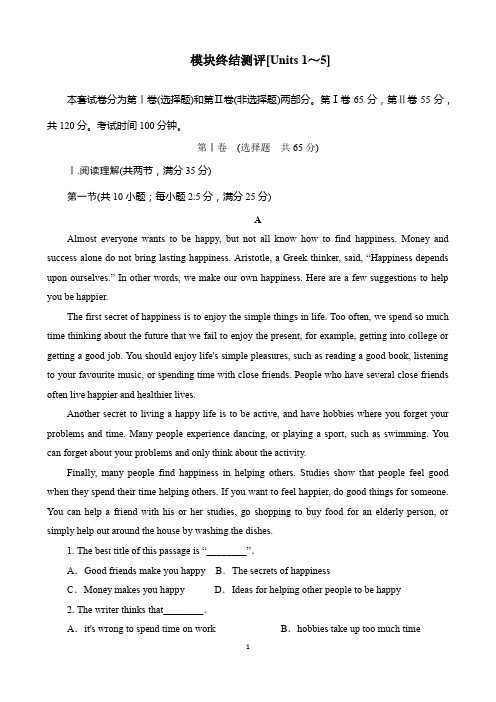
模块终结测评[Units 1~5]本套试卷分为第Ⅰ卷(选择题)和第Ⅱ卷(非选择题)两部分。
第Ⅰ卷65分,第Ⅱ卷55分,共120分。
考试时间100分钟。
第Ⅰ卷(选择题共65分)Ⅰ.阅读理解(共两节,满分35分)第一节(共10小题;每小题2.5分,满分25分)AAlmost everyone wants to be happy, but not all know how to find happiness. Money and success alone do not bring lasting happiness. Aristotle, a Greek thinker, said, “Happiness depends upon ourselves.” In other words, we make our own happiness. Here are a few suggestions to help you be happier.The first secret of happiness is to enjoy the simple things in life. Too often, we spend so much time thinking about the future that we fail to enjoy the present, for example, getting into college or getting a good job. You should enjoy life's simple pleasures, such as reading a good book, listening to your favourite music, or spending time with close friends. People who have several close friends often live happier and healthier lives.Another secret to living a happy life is to be active, and have hobbies where you forget your problems and time. Many people experience dancing, or playing a sport, such as swimming. You can forget about your problems and only think about the activity.Finally, many people find happiness in helping others. Studies show that people feel good when they spend their time helping others. If you want to feel happier, do good things for someone. You can help a friend with his or her studies, go shopping to buy food for an elderly person, or simply help out around the house by washing the dishes.1. The best title of this passage is “________”.A.Good friends make you happy B.The secrets of happinessC.Money makes you happy D.Ideas for helping other people to be happy2. The writer thinks that________.A.it's wrong to spend time on work B.hobbies take up too much timeC.everyone knows how to live a happier lifeD.doing good things for someone can make you happier3. Which of the following is NOT mentioned in the passage?A.Reading a good book. B.Travelling to a foreign country.C.Playing a sport. D.Spending time with close friends.BPeople often ask me how I became successful in that six-year period of time while many of the people I knew did not. The answer is simple: the things I found to be easy to do, they found to be easy not to do.I found it easy to set the goals that could change my life. They found it easy not to. I found it easy to read the books that could affect my thinking. They found that easy not to. I found it easy to attend the classes. They said it probably really wouldn't matter. Six years later, I'm a millionaire and they are all still blaming the economy, the government and company policies. They neglected(忽视) to do the basic, easy things.In fact, the primary reason why most people are not doing can be summed up in a single word: neglect. It is not the lack of money—banks are full of money. It is not the lack of opportunity—the government continues to offer the most opportunities. It is not the lack of books—libraries are full of books—and they are free! It is not the schools—the classrooms are full of good teachers. We have plenty of good advisors. The major reason why so few people take advantage of all that they have is neglect.Don't do the things which cause us to feel guilty(感到内疚的) and guilt erodes our self-confidence. As our self-confidence reduces, so does the level of our activity. And as our activity goes down, so do our results. And as our results suffer, our attitude begins to weaken. And as our attitude begins changing from positive to negative, our self-confidence becomes even less…and on and on it goes.So my suggestion is that when given the choice of “easy to”and “easy not to”,do not neglect to do the simple, basic, “easy” but potentially lifechanging activities.4. Why did the author become a millionaire in six years?A.He was a very lucky man. B.He didn't come across difficulties.C.He did some basic and easy things. D.He set himself longterm life goals.5. The underlined word “erodes”in Paragraph 4 probabl y means “________”.A.changes B.neglects C.weakens D.exposes6. What would be the best title for the passage?A.Being selfconfident workers B.Nothing cannot be neglectedC.Everything is easy to do D.Success is easy, but so is neglectCIn October, Ubayd Steed, a sixth grader in Philadelphia, Pennsylvania, was taking a maths test when he noticed a classmate looking at his paper. “I quickly turned my paper over,” he said. Later that day, Ubayd met the cheater and told him not to do it again.Unfortunately, Ubayd's experience is not unusual. Whether it's kids copying classmates' answers during tests or friends sharing homework, cheating happens in schools every day, and experts say the behaviour starts in the lower grades. Surveys show that one in three elementary students admits to cheating.Jacob Harder, a fourth grader in Ware, Massachusetts, has had classmates ask to copy his homework. “I wouldn't want to just tell them the answers,” he says. So instead, he explains the task and encourages his classmates to do it themselves.But many kids find it hard to say no. “I hear from kids all the time,‘I can't say no to a friend,’” says Eric Anderman, a professor at The Ohio State University who studies cheating in school. He says it's important to say no from the start. “Then you nip____it____in____the____bud,__and the other kids get the message,” he says. Plus, he points out, “A real friend is not going to disown you because he or she couldn't copy your maths homework.”The kids doing the copying may feel they need to cheat to be accepted by other kids. And some students may cheat simply because others do. “If you're in an atmosphere where cheating is common, you may think that if you don't cheat, you're at a disadvantage,” says Michael Josephson, founder of the Josephson Institute of Ethics.But Josephson says students shouldn't think that way. “There are a lot of things kids do,” he says. “You have to decide what kind of person you're going to be.”When school becomes too challenging, Anderman suggests going to the teacher rather than relying on the work of others. “It's good to ask for help,” he says.7. Ubayd's experience serves as a(n) ________.A.explanation B.introduction C.comment D.background8. We learn from the text that cheating in elementary school ________.A.results from difficult tasks B.is popular among studentsC.mainly happens during tests D.is unusual in lower grades9. The underlined part “nip it in the bud”in Paragraph 4 probably means “________”.A.face the difficulty it caused B.realize its disadvantagesC.stop it at an early stage D.make it disappear10. Who advises kids to turn to teachers for help when they fall behind in studies?A.Ubayd Steed. B.Jacob Harder. C.Eric Anderman. D.Michael Josephson.第二节(共5小题;每小题2分,满分10分)根据短文内容,从短文后的选项中选出能填入空白处的最佳选项。
最新版2019-2020年人教版高中英语必修一Unit1单元综合练习及答案-精编试题

Unit1 Friendship单元练习一、听力(听力)(共20小题;共20分)二、单词拼写(单句首字母填空)(共15小题;共15分)21. He arrived an hour late and u all our arrangements(安排).22. It's unwise for the government to i the growing dissatisfaction with its economic policies.23. He appeared c , but inside his heart was beating wildly with fear.24. The children's mother showed great c for their safety when they didn't come back from school at the usual time.25. I wonder if it's because I haven't been able to be o for so long that I've grown crazy about everything to do with nature.26. Her relatives had come to America and s in Boston.27. It didn't take a long time for him to r from the illness.28. You'd better p your bags now; we're leaving in an hour.29. Bill and I often d but we are good friends.30. The student always asks his teacher a s of questions.31. A number of nuclear p stations were planned.32. It was e like your necklace, but it was a different one.33. I am very g to my parents for giving me life and bringing me up.34. Belinda knows Japan really well. Perhaps she could give us a few t .35. Linda's grandma s a serious heart attack last week, which made the whole family worried.三、单词拼写(根据中文提示拼写单词)(共15小题;共15分)36. Charlie spent half an hour (打包) and went to the railway station.37. Tom tried his best to (平静) the frightened children.38. King Henry VII was a poet who showed great (担心) for language.39. The old man felt (感激的) to the young man for his helping.40. He did it on (故意), knowing it would annoy her.41. What (心烦) me most is that I can't catch up with the others.42. If you tell lies, it is you who will (受痛苦) in the end.43. We have different ideas about the issue. That is to say we (不同意) with each other.44. The shape of the trees along the Lytham beach road is the proof of the great (力量) of the wind which comes in off the sea.45. --- Have you finished your experiment report, Jane?--- Oh, my God. I've (完全) forgotten all about that.46. I think it is wrong of you to (忽视) the teacher's advice.47. Children should spend more time taking exercise (户外) and less time watching TV.48. He was very upset but (恢复) himself in time to make a speech.49. The raw materials are struck over and over until they become (变松的).50. They moved the local people and (使…定居) them in another place.四、翻译(根据中文提示完成句子)(共15小题;共30分)51. 我们到场时乐队已经开始收拾乐器了。
新人教版2019-2020学年高中模块综合检测A必修1(英语 解析版
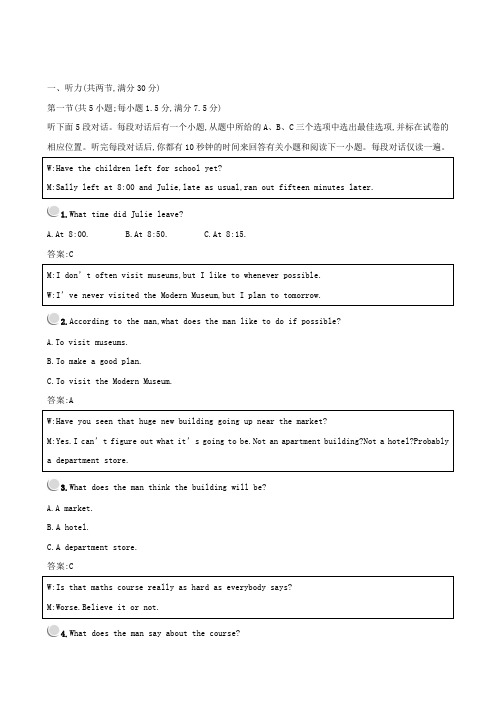
一、听力(共两节,满分30分)第一节(共5小题;每小题1.5分,满分7.5分)听下面5段对话。
每段对话后有一个小题,从题中所给的A、B、C三个选项中选出最佳选项,并标在试卷的相应位置。
听完每段对话后,你都有10秒钟的时间来回答有关小题和阅读下一小题。
每段对话仅读一遍。
1.What time did Julie leave?A.At 8:00.B.At 8:50.C.At 8:15.答案:C2.According to the man,what does the man like to do if possible?A.To visit museums.B.To make a good plan.C.To visit the Modern Museum.答案:A3.What does the man think the building will be?A.A market.B.A hotel.C.A department store.答案:C4.What does the man say about the course?A.It’s hard to know what to believe about it.B.It’s even harder than people say.C.It’s not as hard as he’d thought.答案:B5.What did the woman say about the final exams?A.She would correct the exams.B.Her teaching assistant would correct the exams.C.She would collect the exams.答案:A第二节(共15小题;每小题1.5分,满分22.5分)听下面5段对话或独白。
每段对话或独白后有几个小题,从题中所给的A、B、C三个选项中选出最佳选项,并标在试卷的相应位置。
最新版2019-2020年人教版高中英语必修一阶段质量检测(一)及答案解析-精编试题
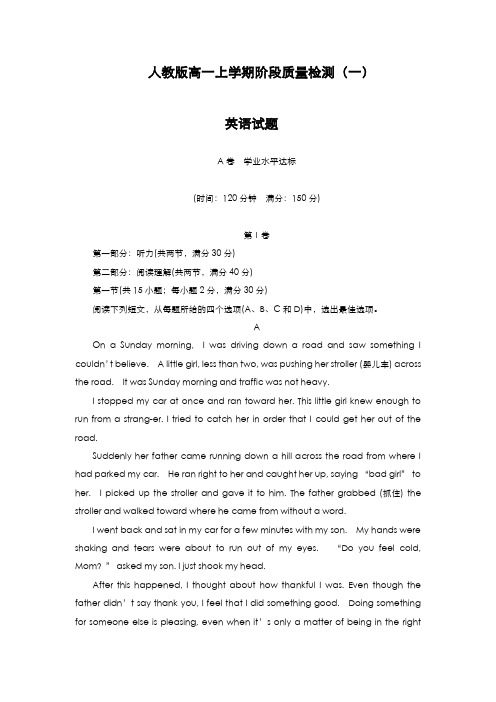
人教版高一上学期阶段质量检测(一)英语试题A卷学业水平达标(时间:120分钟满分:150分)第Ⅰ卷第一部分:听力(共两节,满分30分)第二部分:阅读理解(共两节,满分40分)第一节(共15小题;每小题2分,满分30分)阅读下列短文,从每题所给的四个选项(A、B、C和D)中,选出最佳选项。
AOn a Sunday morning, I was driving down a road and saw something I couldn’t believe. A little girl, less than two, was pushing her stroller (婴儿车) across the road. It was Sunday morning and traffic was not heavy.I stopped my car at once and ran toward her. This little girl knew enough to run from a stranger. I tried to catch her in order that I could get her out of the road.Suddenly her father came running down a hill across the road from where I had parked my car. He ran right to her and caught her up, saying “bad girl” to her. I picked up the stroller and gave it to him. The father grabbed (抓住) the stroller and walked toward where he came from without a word.I went back and sat in my car for a few minutes with my son. My hands were shaking and tears were about to run out of my eyes. “Do you feel cold, Mom?” asked my son. I just shook my h ead.After this happened, I thought about how thankful I was. Even though the father didn’t say thank you, I feel that I did something good. Doing something for someone else is pleasing, even when it’s only a matter of being in the rightplace at the right time.I didn’t really “save” her, but I feel like it was important that I happened to be there. It is sad that I was the only one who stopped. It really made me a little disappointed that no one else stopped to help.语篇解读:不到两岁的小女孩独自推着婴儿车过马路,作者伸手相助,但却遭到小女孩父亲的误解。
人教版新课标高中英语 2019-2020学年 必修一 综合测试 含答案详解

模块终结测评Units 1~5本套试卷分为第Ⅰ卷和第Ⅱ卷两部分。
总分120分。
考试时间100分钟。
第Ⅰ卷Ⅰ.阅读理解(共两节,满分35分)第一节(共10小题;每小题2.5分,满分25分)AMy wife and I used to feel that it was impossible to be a true friend to someone whose name we didn't know. How wrong we were! Years of Sunday-morning bus trips through the city with the same group of “nameless” people have changed our thinking.Before the bus starts off, we all join in a conversation: Where's the silent woman who sits up front and never responds to our cheery greetings? Here she comes. Her worn clothing suggests she doesn't have much money to spare, but she always takes an extra cup of coffee for the driver.We get smiles from a Mexican couple as they get on the bus hand in hand. When they get off, they're still holding hands. The woman was pregnant late last year, and one day her change of shape confirmed that she'd delivered the child. We even felt a little pride at the thought of our extended family.For many months, our only sadness lay in our inability to establish the same friendship with the silent woman at the front of the bus. Then, one evening, we went to a fish restaurant. We were shown to a table alongside someone sitting alone. It was the woman from the bus.We greeted her with friendly familiarity we'd shown all year, but this time her face softened, and then a shy smile. When she spoke, the words escaped awkwardly from her lips. All at once we realized why she hadn't spoken to us before. Talking was hard for her.Over dinner, we learned the situation of a single mother with a disabled son who was receiving special care away from home. She missed him desperately, she explained.“I love him… and he loves me, even though he doesn't express it very well,” she murmured. “Lots of us have that problem, don't we? We don't say what we want to say, what we should be saying. And that's not good enough.”The candles flared on our tables. Our fish had never tasted better. But the atmosphere grewpleasant, and when we parted as friends—we shared names.1.Which of the following might be the best title of this passage?A.The silent woman on the bus B.Friends of the roadC.Going to work by bus D.Different kinds of friendship2.All the following statements can describe the woman except ________.A.poor B.warm-hearted C.cold D.silent3.The woman had the same problem with her son in the way that ________.A.they were both disabled people B.they both liked bus travelC.they both brought interest to the passengers D.they both had some difficulty in expressingBThe arts, especially music, should be part of every school's lessons at every grade level. Students would be much smarter if they had some musical experience. They could improve their classroom skills, like paying attention and following directions. People develop all these skills when they learn music. Making music also lets children use their imagination. It provides students with a chance to try out their own ideas.Music not only makes children better students, but also gives them something positive to do. In a music programme, children can be part of a band instead of joining a gang(团伙). Parents can enjoy listening to their children's music instead of seeing them glued__to a computer or TV screen. In a school band, students get to be part of a team. They can get along well with old friends and make new friends through music.Music builds self-confidence, too. It gives children a sense of achievement and success. Making music is something for them to be proud of, and it lets kids practise performing in front of an audience. Music gives children an opportunity for self-expression, and that helps develop their self-confidence.Once again, music is important because it can make children better students, give them something positive to do, and build their character. That is why music should be offered in every single grade in every school.4.What does the underlined phrase“glued to”in the second paragraph mean?A.Unwilling to turn on. B.Always looking.C.Unwilling to leave. D.Always playing.5.The third paragraph mainly tells us that music could ________.A.give children self-expression and self-confidenceB.bring children achievement and successC.give children something to be proud ofD.develop children's self-confidence6.What's the best title of this passage?A.Music is a must as a course at school B.Music builds children's self-confidenceC.Music makes students much smarter D.Learning music and making musicCHave you ever considered all the English expressions that include words about clothes? Let's have a look.People wear pants to cover the lower part of their bodies. We sometimes say that people who are nervous have ants(蚂蚁)in their pants. Sometimes, people may get caught with their pants down. They are found doing something they should not be doing. And, in every family, one person takes control. Sometimes a wife tells her husband what to do. Then we say she wears the pants in the family.Pants usually have pockets to hold things. Money that is likely to be spent quickly can burn a hole in your pocket. Sometimes you need a belt to hold up your pants. If you have less money than usual, you may have to tighten your belt.I always praise people who can save their money and not spend too much. I really take my hat off to them. Yet, when it comes to my own money, I spend it at the drop of a hat, which means I instantly spend it.Boots are a heavy or strong kind of shoes. People who are too big for their boots think they are more important than they really are. I dislike such people. My father is an important person. He runs a big company. He wears a suit and tie, and a shirt with sleeves(衣袖)that cover his arms. Some people who do not know him well think he is too serious and never shows his feelings openly. But I know that my father wears his heart on his sleeve.7.Which of the following expressions can show someone is nervous?A.Get caught with one's pants down. B.Have ants in one's pants.C.Wear the pants in the family. D.Burn a hole in one's pocket.8.If we say someone has to tighten his belt, we probably mean he ________.A.has done something wrong B.used to live a rich lifeC.has put on the wrong pants D.is short of money9.Someone who spends his money at the drop of a hat most probably ________.A.doesn't save money B.earns much moneyC.never wastes his money D.spends more than he earns10.We can use the expression “wear one's heart on one's sleeve” to describe someone who ___.A.gets angry easily B.looks very seriousC.shows his feelings openly D.often wears a suit and tie第二节(共5小题;每小题2分,满分10分)根据短文内容,从短文后的选项中选出能填入空白处的最佳选项。
2019-2020学年高中英语北师大版必修1练习:模块综合测评-附答案

模块综合测评(时间:120分钟满分:150分)第一部分听力(共两节,满分30分)(语言能力)第一节(共5小题;每小题1.5分,满分7.5分)听下面5段对话。
每段对话后有一个小题,从题中所给的A、B、C三个选项中选出最佳选项,并标在试卷的相应位置。
听每段对话前,你都有5秒钟的时间阅读题目;听完后,各小题给出5秒钟的作答时间。
每段对话仅读一遍。
A.Clothes.B.Tool.A.Snowy.B.Sunny.C.Cloudy.3.What caused the man’s headache?A.Too little sleep.B.The hat.A.At 8:30.B.At 8:50.5.What is the relationship between the two speakers?A.Friends.B.Strangers.第二节(共15小题;每小题1.5分,满分22.5分)听下面5段对话或独白。
每段对话或独白后有几个小题,从题中所给的A、B、C三个选项中选出最佳选项,并标在试卷的相应位置。
听每段对话或独白前,你将有时间阅读各个小题,每小题5秒钟;听完后,各小题将给出5秒钟的作答时间。
每段对话和独白读两遍。
听第6段对话,回答第6至8题。
A.After midnight.B.When she is free.7.Why was the man unhappy?A.He lost his meal tickets.B.The food was terrible.8.Why did the man feel even worse?A.He didn’t sleep well.B.He wasted so much time.听第7段对话,回答第9至11题。
9.What are the two speakers?puter experts.B.College students.10.Why did the girl hand in her term paper earlier?A.Because she was good at grammar.B.Because she used the computer to write the paper.11.What will the girl do this evening?A.She’ll study the IBM computer.B.She’ll help the boy rewrite the paper.ll teach the boy how to use the word processor.听第8段对话,回答第12至14题。
- 1、下载文档前请自行甄别文档内容的完整性,平台不提供额外的编辑、内容补充、找答案等附加服务。
- 2、"仅部分预览"的文档,不可在线预览部分如存在完整性等问题,可反馈申请退款(可完整预览的文档不适用该条件!)。
- 3、如文档侵犯您的权益,请联系客服反馈,我们会尽快为您处理(人工客服工作时间:9:00-18:30)。
2019-2020年高一英语必修1综合测试题及答案解析第一部分:听力(共两节,满分30分)第一节(共5小题;每小题1.5分,满分7.5分)听下面5段对话。
每段对话后有一个小题,从题中所给的A、B、C三个选项中选出最佳选项,并标在试卷的相应位置。
听完每段对话后,你都有10秒钟的时间来回答有关小题和阅读下一小题。
每段对话仅读一遍。
1.How does the man like the English language spoken by the woman?A.Fairly good.B.Excellent.C.Strange.2.What country does Susan presently call her home?A.Spain. B.New Zealand.C.United Kingdom.3.How did the woman know so much about Egypt?A.She learned from the book.B.She learned from a long film.C.Her uncle told her.4.Which of the following places didn't the woman visit?A.America. B.Wales.C.Scotland.5.How is the man probably getting to work?A.On foot. B.By bus.C.By car.第二节(共15小题;每题1.5分,满分22.5分)听下面5段对话或独白。
每段对话或独白后有几个小题,从题中所给的A,B,C三个选项中选出最佳选项,并标在试卷的相应位置。
听每段对话或独白前,你将有时间阅读各个小题,每小题5秒钟;听完后,每小题将给出5秒钟的作答时间。
每段对话或独白读两遍。
听第6段材料,回答第6至7题。
6.Where is the man from?A.Britain. B.Scotland.C.England.7.What is true according to the passage?A.Scotland lies to the south of England.B.Scotland is a part of Britain.C.Scotland lies to the east of England.听第7段材料,回答第8至9题。
8.How long will it take the man to get to the museum?A.Half an hour.B.About a quarter. C.Two hours.9.Where can the man buy a city map?A.At the street corner. B.At the bookstore. C.At the gate of the museum.听第8段材料,回答第10至12题。
10.What has the woman come to the office for?A.To ask for a job. B.To see her friend. C.To make fun of the man.11.Which place does the woman want to go?A.A larger country. B.A nearer country. C.A new and different country.12.Why does the woman dislike working in the Middle East? A.Because she hates living there.B.Because she lived there for years.C.Because it is far from home.听第9段材料,回答第13至16题。
13.How long is the vacation?A.25 days.B.10 days.C.5 days.14.Where is the man going together with his family? A.Hawaii. B.Europe. C.America.15.Which of the following is true according to the conversation? A.His wife wants to buy books during the vacation.B.His children are all excited.C.He wants to go to Europe.16.How will the woman's family visit friends?A.By ship. B.By boat.C.By air.听第10段材料,回答第17至20题。
17.How many people are there in Basel?A.Over 350,000. B.Over 650,000.C.Over 35,000.18.What language does most of the people speak in Basel?A.English. B.German.C.French.19.How many countries meet at Basel?A.Three. B.Four.C.Five.20.When was the University of Basel founded?A.1416. B.1460.C.1466.答案:1-5 BCCAC6-10 ABBCA11-15 CBBAB16-20 CABAB听力原文Text 1M:I was born in New Zealand,what about you? Where are you from?W:I'm Chinese.M:Chinese? But your English is excellent. Where did you learn English?W:In China.Text 2M:Where did Susan come from?W:She was born in Spain and grew up in New Zealand, but now she is a citizen of Britain.Text 3W:Egypt is an ancient country, and it's famous for the pyramids.M:How do you know so much about that country?W:Oh, my uncle once worked there for a long time.Text 4W:Have you ever been to Northern Ireland? Besides, I visited Scotland and Wales two years ago.M:But Northern Ireland belongs to the Great Britain!Text 5W:I've got to go to New Zealand this afternoon, but I'm too tired to drive and the bus is so crowded.M:No problem. I'll drop you off at the train station on my way to work.Text 6W:Well, where are you from? Oh, I know, your homeland must be Australia.M:No, I'm from Britain.W:Oh, I thought you said you were not English!M:That's right. I'm British, but not English. What about you?W:I come from Scotland, and I'm a native of Scottish blood.M:Where's it?W:It lies to the north of England, part of Britain.M:Oh, I see.Text 7M:Excuse me. I am a stranger here and I've lost my way.W:What can I do for you?M:Could you please tell me the way to the museum?W:That's easy. Go straight ahead and take the second turn on your right. Walk down that street to the end.M:How long will it take me?W:About fifteen minutes.M:By the way, where can I get a city map?W:I am sure you can get one at the gate of the museum.M:Many thanks to you.W:My pleasure.Text 8M:Mrs Smith, we're very pleased that you want to work for our company. I wonder if you'd be interested in working in India.W:India? I lived there. I was there for four years.M:How about Brazil?W:Brazil? No, I worked there.M:Well, would you consider the Middle East?W:Certainly not. I worked there, too. I spent three years there.M:Well, there's Russia, perhaps.W:No, not Russia. I've seen Russia.M:It's a big country.W:Yes, and I lived there for a long time. Can't you find any other country?M:Well, there's this island in the Pacific Ocean.W:Island? Which island? I lived there.M:But, Mrs Smith, there are thousands of islands, as we all know.W:Well, I've seen them all. Really, can't you let me go to a different country from all those you've mentioned?Text 9W:When are you going to take your vacation?M:I've got a ten-day vacation starting from July 25.W:Where are you going?M:Hawaii.W:That sounds like a good place. Are your whole family going?M:Yes. We plan to climb the mountains, go fishing, go swimming, and wind surfing, most of all relaxing. My wife is taking a whole bunch of books to read.W:Your children must be all excited about it.M:Yes, they are. They're already crossing out the days on the calendar. Are you going to Europe again this summer?W:No, not this time. We're going to visit some old friends in Egypt.M:Are you shipping or taking a flight?W:We are going by air.Text 10Visitors to Switzerland usually include Basel in their list of cities. It has a population of over 350,000, the majority of whom speak German. However, it is considered a kind of international city, because it stands right at the point where three countries meet. Many visitors go to the place in the city where three-sided marker says France on one side, Germany on another, and Switzerland on the third. The Rhine which divides the city, becomes wide and deep enough just at this point for ships to sail all the way up to the North Sea.Basel is quite an old city too, having risen in importance five centuries ago. The University of Basel was founded in 1460, and is still wellknown today.第二部分:阅读理解(共两节,满分40分)第一节(共15小题;每小题2分,满分30分)阅读下面的短文,从每题所给的四个选项(A、B、C、D)中,选出最佳选项。
